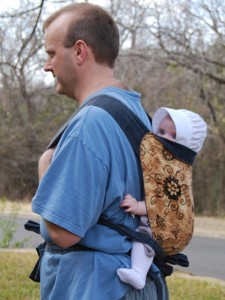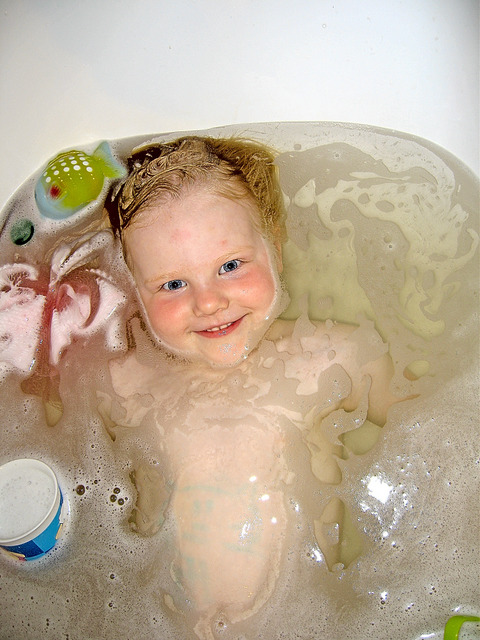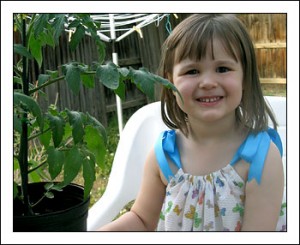Originally posted March 30, 2007, when my daughter was two and my son was five.
I’ve been thinking a lot recently about weaning. Not as in, “I’ve been thinking a lot about the fact that my daughter should wean”, but more like, “I’ve been thinking a lot recently about the process of weaning, and what that means to me and to my daughter.” I suppose I could have just used that as my opening sentence in the first place.
When my son was born, I set a goal of nursing him for two years. But because I didn’t want to overwhelm myself with such a huge undertaking, I made it a series of smaller goals. My first mini-goal was one year. The next was 18 months. The final goal was two years.
Before he was 18 months old, he started cutting back his nursing sessions. He had been nursing eight to 10 times a day, but when he was about 15 months, he nursed just six to eight times per day. The next month he cut it back to five or six times. The next month was three to four times, and the last month was just once per day. I neither encouraged nor discouraged it. My son weaned completely of his own accord and on his own schedule. I had talked to many women during my time nursing him, and so many of them had told me that when their babies weaned before they (the mothers) were ready, they were heartbroken and disappointed. I knew I never wanted to feel that way. So when my son began his weaning process, I was surprised to realize that I was ready; I was at peace with the whole process. When he was completely weaned, I felt no sadness, no disappointment. It was a good transition that he and I made together. I didn’t make my time line goal of two years, but that didn’t matter, because the end had been so peaceful.
When I became pregnant with my daughter, I did not set an arbitrary time limit, but as a more experienced mom, I knew I just wanted to follow her lead. I very soon realized that she was a completely different nurser than her brother. My son liked to do his bit, take in his nourishment, and then leave; he was never big on comfort nursing, or nursing at times when food is not the first goal, but rather the cuddle time and the calming effect of suckling. My daughter has always been a big comfort nurser. My son was a very difficult baby to nurse, (which I know now is because of all his oral difficulties) while my daughter has always been such an easy baby to nurse. He was a biter; she has always been so gentle. He was a concentrated little nurser, who focused on nothing but the task at hand; she has always been so distractible!
Time passed, and my daughter reached her first birthday, and she was nursing as much as ever. She hit 18 months, and showed no signs of slowing down. She’s now two years old, and is still as excited about nursing as she was 18 months ago. This was fine with me. I have no problem with nursing a toddler (either in theory or practice) so I just took it in stride. True to my beliefs, I continued to follow her lead. She seemed to still needed to nurse for comfort and security, so we continued happily.
But after a recent very bad day, where one of the many many things that went wrong that day was that my daughter started biting me seemingly out of the blue, I began to consider the possibility of weaning. My son was a biter, but being bit by a six month old is completely different than being bit by a two year old toddler! No comparison, really. I was in pain, I was angry, and as everything, everything had gone bad that day (with both kids) I was at the end of my rope and out of patience. I made the decision to wean.
Weaning lasted exactly six hours. Weaning is a huge decision, and I realized that I want my daughter’s weaning to be as peaceful as my son’s. To wean her suddenly would be traumatic for her, and that’s not how I wanted it to end. But she had reached two years old – the age that I said my goal was for my son. Was that not also my goal for her? We had reached two years!
Over the next two days, I flip-flopped between the decision to wean and not wean about twenty times. I finally realized that my decision to wean had been made when I was at a very vulnerable point, and I know myself enough to know that I don’t want to have to live with any regrets or guilt about weaning. But on the other hand, how wonderful would it be to wear pretty bras again? To have my body all to myself! To sit down and read the paper and not be asked to nurse! And she did have two years of nursing – I had given her a great start in life!
But, after a few days of experimentation with weaning, I realized the fact that my daughter herself is not ready to wean. She still relies on nursing for comfort and safety. That was made very clear to me during those days, as she was in obvious distress. How can I take such an important source of comfort and nurturing away from a two year old? It seems cruel. And I know that in my heart, I will not feel good about weaning unless my daughter is the one to initiate it, as my son had. I will not be at peace with with the process if I am the one to force her to wean when she is so obviously not ready. Instead setting the goal according to the calendar, my goal is set to her.
So here I am, still lactating after all these years. My daughter will nurse until she decides she is done. She will sleep with us until she decides she is ready for her own room. (My son was 2 1/2 when he chose to go to his own room. I suspect my daughter will be later.)
And no, she has not bitten me since that one day, and that is the only time she’s ever bitten me. It took me three days to heal enough to not wince when she latched on.




 I didn’t set out to nurse a preschooler, but somehow along the way, my sweet little baby grew from an infant to a toddler and eventually blossomed into a preschooler in what now seems like the blink of an eye. I am confident this won’t go on forever and when I look back on this time when she’s 10 or 20 or 30, and I look at the young woman she’s become, I am hopeful that I will feel good about the choices I made and have no regrets.
I didn’t set out to nurse a preschooler, but somehow along the way, my sweet little baby grew from an infant to a toddler and eventually blossomed into a preschooler in what now seems like the blink of an eye. I am confident this won’t go on forever and when I look back on this time when she’s 10 or 20 or 30, and I look at the young woman she’s become, I am hopeful that I will feel good about the choices I made and have no regrets.